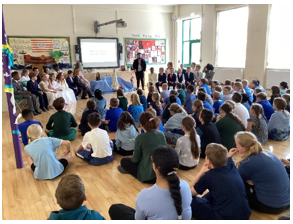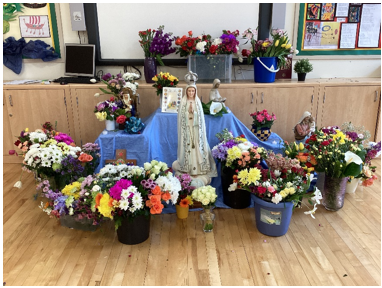RE
Religious Education Curriculum
At St Joseph’s we want every child to be happy and enthusiastic learners who are eager to achieve their very best in order to fulfil their God-given talents.
We firmly believe that the recipe for this success is high quality first-wave teaching in all areas of the curriculum. The teaching of RE and our Catholic life ethos are very much central to the life of our happy and nurturing school.
Intent – What we are trying to achieve?
At St Joseph's, we will enable every child to develop a deeper understanding of the Catholic faith whilst also instilling in them respect and understanding of religious and moral values of other faiths and cultures. We shall foster the growth of each child’s potential through the development of respect for self and others.
We shall promote an understanding and care of the environment in which each child finds him/her-self. We shall promote a strong and co-operative relationship between home, parish and school.
At St Joseph’s Primary school, we live by the motto:
“We Live, We Learn, We Love, We Share.”
- Our principal aim is that children leave St Joseph's with a wide range of happy and rich memories in RE formed through interesting and exciting experiences. These shall be driven through an engaging and comprehensive curriculum, enabling each child to develop a living and personal faith in Jesus Christ.
- RE is the foundation of the entire education process and permeates all areas of the curriculum and school life.
- Children will meet the Diocesan Standards for Primary Religious Education, which will be taught by highly qualified staff who will engage children’s intellect, heart and imagination, inspiring enthusiasm and interest in RE.
- Children will develop an awareness of God’s presence in their lives and the lives of others, developing the spiritual life of each child through prayer and reflection.
- Children will develop a well-formed conscience allowing them to make sound moral judgements in the light of personal commitment to God.
- Parents, family members, friends of whatever faith and parishioners will attend Masses and religious celebrations within the school and pupils will participate in parish activities outside of school time, promoting good links with the Parish of St Josephs.
- Children will develop the knowledge, understanding and appreciation of the Sacraments.
- RE will play a central role in the school’s work on spiritual, moral, vocational, social and cultural education.
- Children will be prepared for life in a multi faith society by fostering respect for and understanding of rich cultural diversity.
- RE is a core subject of the curriculum and all children will study RE for 10% of the weekly timetable.
- Opportunities will exist for children of all ages to experience learning beyond the classroom, allowing them to enrich their knowledge. For example by visiting St Joseph’s Church, the Cathedral Church of St Marie’s, the Madina Mosque and also participating in Diocesan Pilgrimages.
- In RE, children will develop the skills to make links and connections, engage and respond, analyse and evaluate using sources of evidence.
- Children will develop a real understanding and appreciation of the world learning from a range of sources and experiences.
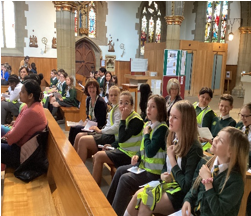
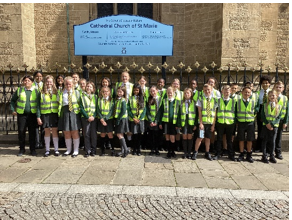
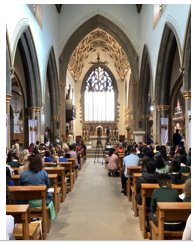
Implementation – How do we translate our vision into practice?
- The curriculum hours in RE are non-negotiable and will be followed by all staff in the school. Fixed timetables will be set before the academic year and monitored by the Senior Leadership Team of the school.
- The Subject Leaders for RE and Catholic Life will meet Governors on a termly basis to evaluate provision in order to ensure that teaching and learning in RE is good or better.
- Carefully designed schemes of learning in RE ensure consistency and progress of all learners. We follow the agreed syllabus “Come and See.”
- Each year group will study a number of units over the year. The units are developmental, building on previous knowledge and experience and taking into account of the children’s age and understanding.
- The topics covered by each year group are as detailed on the curriculum overview and year group knowledge organisers.
- RE is taught individually but plays a central role in all areas of school life.
- Children will be highly engaged in RE lessons through the use of a variety of sources such as religious stories, scripture, religious artwork, songs, music, dance and religious signs and symbols.
- Approaches will include whole class teaching, group activities and individual work. Children will have opportunities to work individually as well as cooperatively and collaboratively, developing their own knowledge and expertise as well as sharing experiences with others.
- Pupils will participate in Mass, feast days, Holy days collective worship which will involve religious actions and worship.
- The use of visits and visitors in school will enhance the RE curriculum.
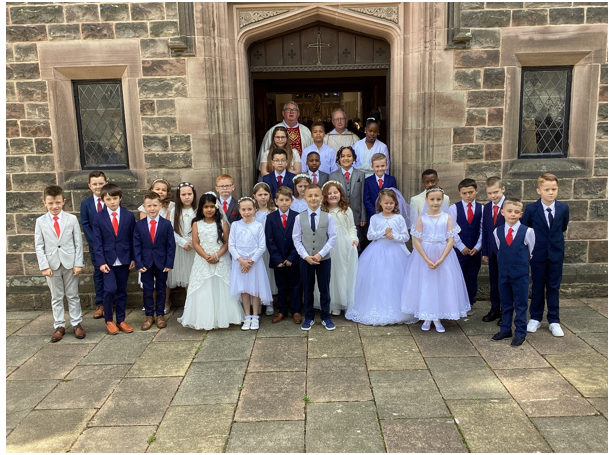
Impact – What is the impact of our curriculum on the students?
- Children are happy learners within RE. They experience a wide-ranging number of learning challenges in RE and know appropriate responses to them.
- Through RE, children deepen their appreciation of their faith and fulfil their God-given talents
- Visits within RE have enriched the lives of the children and they are able to discuss how the experience impacted their knowledge and understanding.
- Children of all abilities and backgrounds achieve well in RE, this is reflected in their good progress.
- Fundamental British Values are evident in RE and children understand how RE can celebrate difference.
- The children will grow to know and love God, develop their moral and spiritual nature and deepen their faith.
- Children will live their faith in an active and positive way, always aware of the presence and love of Christ guiding them.
- Through religious practice, the church’s traditions of prayer and worship will be upheld.
- Children are confident, resilient and actively engaged in the wider society.
- The school environment will reflect and celebrate our Catholic faith.
- Children will be able to define, describe and discuss areas of RE. They will confidently use skills such as retelling, describing, comparing, giving reasons, explaining the meaning of biblical stories and considering the impact of beliefs.
- Children will be able to reflect and consider important questions about RE.
- Through wider reading in RE, children will know about a wide variety of Saints, how we can learn from their example, and historical religious events and figures. They will be able to make links between Jesus’ life and teaching and link it to their own lives, making links between different forms of Christian action, such as in rituals and charitable acts.
